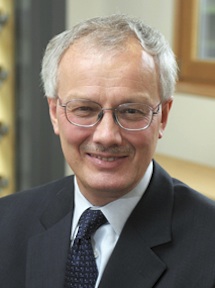By Kevin Wang
There is a tendency in science for reclusion. To discover the things that scientists discover takes many years of solitary thought and experimentation. And though science today relies increasingly on collaboration, networks of communication largely remain constrained to the scientific community. The public life, in most cases, is not for the scientist.
But for Sir Peter Crane, it is. Crane, a plant biologist, has served as director of the Royal Botanic Gardens, Kew, director of the Field Museum of Natural History in Chicago, and most recently, dean of the Yale School of Forestry and Environmental Studies. While a dean at Yale, he was chosen as a Phi Beta Kappa Visiting Scholar for 2011-2012. The Society’s Visiting Scholar Program fosters intellectual exchange by bringing nationally recognized scholars to colleges and universities for lectures, class visits, and other events that expose students and faculty from across the country to ideas and areas of research beyond their own institutions.
As a ΦBK Visiting Scholar, Crane visited six schools, among them Rhodes College in Memphis, University of Florida in Gainesville, and University of the South (Sewanee), and here’s what he reports about the experience: “I learned a lot of interesting things, met many interesting people, talked with a bunch of great students. The interaction with the faculty and students was very stimulating,” says Crane. “I also designed the talks to be more general and interdisciplinary. So by their very nature, they initiated conversations with faculty from different areas, like the humanities.”
This passion for public engagement in science has been a defining yet mercurial element of Crane’s career as a scientist. After spending seven years as director of the Field Museum of Natural History in Chicago, he moved to London where he served as director of the Royal Botanic Gardens, Kew. After seven years at Kew, Crane returned to the US for three years as a professor at the University of Chicago before moving to Yale, where he spent the most recent seven years of his career. “I wanted to take on new challenges,” says Crane. “I don’t want to feel stale, or that I’m losing steam.”
The biggest challenge for Crane, however, came with the writing of Gingko: The Tree that Time Forgot (Yale University Press, 2013), a critically acclaimed popular science book that tells the story of the 250-million-year-old tree. “That was a personal challenge to myself, a deliberate choice to do something more general,” Crane says. The success of the book, which The New York Times lauded as “so enticing it will leave you greedy for more,” is thus a testament not only to Crane’s extraordinary scholarship, but also to his knack for engaging the public in the wonders of science. “At the end of the day,” says Crane, “most of science is supported by the public. We have a responsibility to feed back what we’ve been learning.”
To ask of a scientist to write as a non-scientist is a tall order. But Crane argues that members of the public are not the only people to benefit from such writing. “People say you should write about what you know about,” Crane says. “I think that’s obviously correct, but when you try to write a more general piece you do learn new things, and you come across things you didn’t know. Writing that Gingko book wasn’t intended to benefit my science, but thinking about some of those questions and coming across some things I came across while writing that book actually fed back to my science, and they’re now active topics of research that are really quite interesting. Now that’s fun.”
Unsurprisingly, a public life in science does bring with it its own challenges. “I do think the role of leadership is underrated,” says Crane. “Faculty tend to roll their eyes when you mention administration. It’s almost as if you’re a second class citizen or have somehow gone over to the ‘dark side.’ But it turns out that people really do make a difference to an organization, and if you want to make a difference, those are the kind of roles that you have to take, even though you may not get credit from your peers for it.”
But Crane charges forward. In July he left Yale to become president of the Oak Spring Garden Foundation, a philanthropic start-up that aims to facilitate scholarship and public dialogue about the relationship between plants and human beings. “You don’t often get the opportunity to start an organization from scratch,” says Crane. “At Kew I had 650 employees. Now I have a tiny little team, but we have a lot of potential. We’re going to do some interesting and useful things. And we’ll have a lot of fun along the way.”
Kevin Wang is a senior at Yale University majoring in molecular biophysics and biochemistry. He was elected to ΦBK as a junior and is currently serving as vice-president of the Yale Phi Beta Kappa chapter. Yale is home to the Alpha of Connecticut Chapter of Phi Beta Kappa, founded in 1780.
Follow Kevin on Twitter @kkwang23.




